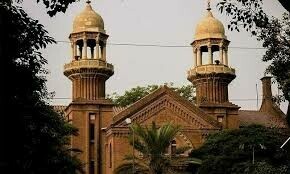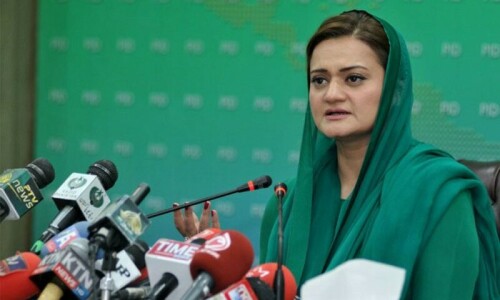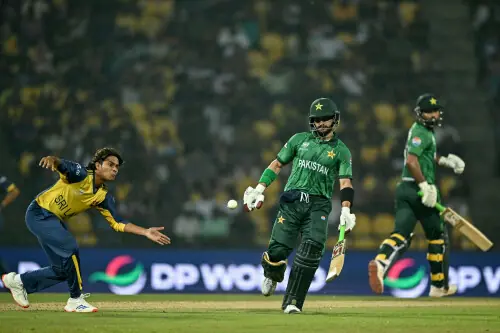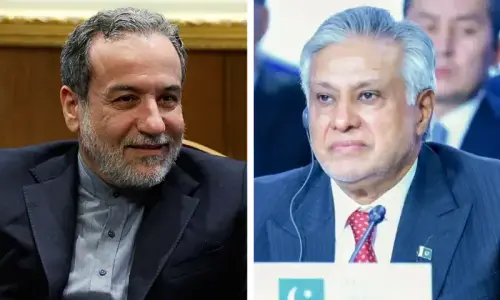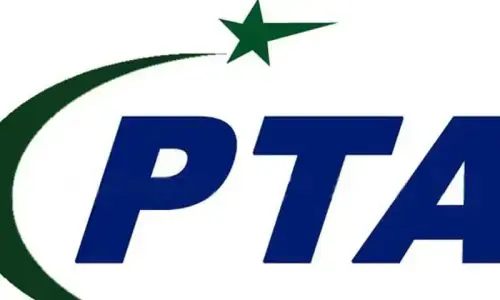In a major relief for incarcerated ex-premier and PTI founder Imran Khan, the Lahore High Court (LHC) on Thursday set aside his physical remand in a dozen new cases over last year’s May 9 riots.
The “arrest” in these cases had come just a day after the former prime minister and his wife Bushra Bibi had been rearrested in a new Toshakhana case — following their acquittal in the Iddat case, which had them on the brink of being free from jail.
However, Imran, along with his spouse, is expected to remain in jail in the fresh Toshakhana case, the arrest in which he has challenged in the Islamabad High Court.
Imran, 71, has been imprisoned at the Adiala Jail for almost a year upon his conviction in four cases — two Toshakhana references, the cipher case, and the Iddat case, in which his wife, Bushra Bibi, is also jailed.
Imran’s sentences in the Toshakhana references were suspended while he was acquitted by the Islamabad High Court (IHC) in the cipher case in June. An Islamabad district and sessions court had also recently accepted the appeals filed by Imran and his spouse against their conviction in the Iddat case.
Various courts have also acquitted him in several other cases filed against him since the events of May 9, 2023 — the day when his first arrest had caused riots across the country, following which the state launched a crackdown against him and his party.
However, shortly after the court acquitted him in the Iddat case, the National Accountability Bureau (NAB) had re-arrested the couple in a new Toshakhana case, scrapping his and his supporters’ plans of a possible release from prison.
As NAB secured Imran’s eight-day remand in the Toshakhana case on July 14, the Lahore police had also “arrested” him in connection with a dozen new May 9 cases. A Lahore ATC had then granted police Imran’s 10-day physical remand against a request for a 30-day remand.
Subsequently, on July 18, Imran had approached the LHC challenging his physical remand in 12 criminal cases of last year’s violent attacks on military facilities and other properties, including the Lahore corps commander’s residence. He had argued that the ATC order be declared illegal and set aside, and that his custody be transferred from the police to judicial custody.
After issuing notices on Tuesday, an LHC division bench had yesterday asked the prosecution to justify the need for Imran’s physical remand.
The bench had observed that the prosecution needed to justify what evidence necessitated the remand of the petitioner.
Today, Justice Tariq Saleem Sheikh and Justice Anwarul Haq Pannun resumed the hearing, where Advocate Salman Safdar appeared as Imran’s counsel while Punjab prosecutor general Farhad Ali Shah was also present.
Hearing a separate petition, the bench also set aside a notification permitting Imran’s appearance in court cases via video link due to security reasons.
LHC dismisses Imran’s plea to avoid ‘detention by army’
Separately, Imran also filed a petition before the LHC to preempt his possible detention by the army amid “circulating rumours” that plans were underway to try him for the May 9 riots through a “court martial”.
However, the plea was dismissed as Justice Sheikh upheld the objection raised by the LHC registrar’s office over the absence of Imran’s signatures on the power of attorney.
Countrywide protests erupted on May 9 last year after the paramilitary Rangers whisked away Imran from the IHC in a corruption case. While protests against his arrest were underway, social media was flooded with footage of rioting and vandalism at various spots, including the Lahore Corps Commander’s residence and General Headquarters, the army’s head office in Rawalpindi.
Thursday’s petition, filed by Advocate Uzair Karamat Bhandari and a copy of which is available with Dawn.com, requested that Imran “be retained in civilian hands and subject to the jurisdiction of civilian courts.”
“[…] Rumours started circulating that Petitioner No. 1 [Imran Khan] will be shifted to the custody of army authorities today (i.e. 25.7.2024) in connection with the very cases which form the subject matter of Writ Petition No. 45901 of 2024 and connected matters”, the petition read.
It added that Imran had just a few days ago expressed the apprehension — which was also widely reported in the media — that plans were “afoot to try him for the events of 9 May through a court martial”.
“It appears that the implementation of those plans has been accelerated because of the proceedings in the aforementioned case,” the petition added.
It also requested that the respondents — including the Punjab and Islamabad inspector-generals, the Federal Investigation Agency (FIA), and others — be “restrained from handing over the custody of [Imran] to army authorities.”
According to the petition, the LHC in its Wednesday hearing raised concerns about the legality of the action taken and orders passed against Imran, which created “a sense of panic in the ranks of those who are desperate to keep him behind bars on one pretext or the other.”
The petition added that if the army detained Imran, it would be “a complete travesty of justice and due process”.
“It will be completely against the law declared by a 5-member bench of the Honourable Supreme Court of Pakistan.”
On Tuesday, Imran had refused to undergo a polygraph — considered to be a ‘lie detector’ test — as well as photogrammetry and voice matching tests, despite a Lahore police team’s efforts to interrogate him regarding the dozen fresh May 9 cases.
The hearing
At the outset of the hearing of the petition against physical remand in the May 9 cases, Justice Pannun asked how many cases the ex-premier was nominated in.
Safdar replied that his client was named in three cases, explaining that there were two “categories” of cases — one where he was nominated by name and the other where he was nominated through supplementary statements.
The Punjab prosecutor general then presented the record of all cases registered against Imran along with a report of the progress in those cases.
“When the petitioner saw hope that he will get out of jail, you made his arrest in these cases. According to the law, you ought to arrest a suspect as soon as you find out about him. Why did you not arrest him before?” Justice Pannun asked Shah.
To this, the prosecutor general replied that Imran was on interim bail previously and, hence “could not be arrested”. When the judge asked him if attempts had been made previously to investigate the case, Shah answered, “I can tell you from the record that the PTI founder wrote to us that he will not join the investigation.
“We have reports from Pemra (Pakistan Electronic Media Regulatory Authority) but the petition is joining the probe,” he added.
Here, Justice Sheikh highlighted that it must be ascertained “whether there was even a need for a remand of these many days”.
Referring to Imran’s refusal to have his polygraph, photogrammetry and voice matching tests, the judge remarked: “If the petitioner does not have any tests conducted, then he will be responsible for its consequences.”
The prosecutor general then informed the court that Imran had submitted in writing that he would have his statement recorded in his lawyer’s presence as he “does not have trust in the police”.
Justice Sheikh then wondered why there was a need for physical remand for a polygraph test. “You have to conduct some tests for 15 to 20 minutes. Why do you need a physical remand for this?” he asked, noting that the “timing of the petitioner’s arrest was important”.
The prosecutor general explained that Imran himself had cited dangers to his life for not appearing in courts. Reiterating that the ex-prime minister was previously on interim bail, Shah said that as soon as an antiterrorism court rejected his bail pleas, the police arrested him in these cases.
“Pemra’s reports are with us. We have to conduct investigation,” the official said.
Here, Justice Pannun asked what the Pemra reports were, quipping: “If Pemra calls a girl a boy, it cannot be believed.
“If a political person complains, we have to judge whether his mentality is criminal or not,” he observed.
Justice Sheikh then asked the prosecutor to tell what crime Imran had committed in a certain tweet and under what laws would proceedings be pursued.
When the hearing resumed after a brief break, the prosecutor general presented details of PTI’s social media accounts before the court and read aloud tweets made from Imran’s account. “A specific narrative was concocted,” he asserted.
“Judges are nowadays receiving greater threats than the tweet that you have read,” Justice Pannun remarked.
“Tell me, is ‘vote ko izzat do’ (respect the vote) not a narrative?” he asked the prosecutor. “Saying that [people’s] vote is not receiving due respect due to the army chief is not a narrative,” Shah replied.
At this point, Justice Sheikh asked how it was a crime if the petitioner had called for protests. “If he would have led the attacks, then definitely it would have been a crime,” he observed.
“We will not read what material there is against the petitioner. The prosecutor general himself will have to read,” Justice Pannun remarked.
Here, Justice Sheikh emphasised that the ATC judge should have determined whether a physical remand was even rightful. When the judge asked what section was being applied against the petitioner, the prosecutor replied, “Action will be taken for rebellion under section 121 [of the Pakistan Penal Code].”
Justice Sheikh noted that Section 121 had been struck down by the LHC. The court had last year invalidated Section 124-A of the PPC, commonly known as sedition law.
The prosecutor then argued that a security branch officer had stated that Imran had issued directives to “shut down the country and attack GHQ” in case he was arrested by Rangers or military forces.
Stating that the police investigation would be affected, the official urged the court to dismiss Imran’s petition. “We have yet to recover the mobile phones used to make the tweets,” he said.
“Even if you have to recover items, how will you do that if you cannot move the petitioner out of jail?” Justice Pannun asked.
In his arguments, PTI lawyer Safdar noted that Imran had already secured bail in a case in which a government counsel had recorded his statement that was read aloud today.
“In nine cases, the police kept sleeping for 425 days and in the other three, it was asleep for 170 days,” Safdar quipped.
Subsequently, the bench reserved its verdict on the plea against physical remand.
Justices Sheikh and Pannun also took up Imran’s separate petition against court appearance via video link.
Safdar was present as the ex-premier’s counsel in that hearing as well, where he argued that for physical remand to be granted by a court, the suspect’s appearance in person was necessary.
“There is no such compulsion that the PTI founder cannot be presented before the court,” he stated, highlighting that providing security was the government’s responsibility.
“They are using security as an excuse to deliberately not present the PTI founder for physical remand,” the lawyer claimed. Subsequently, the court set aside the notification allowing Imran to attend case proceedings via video link.

